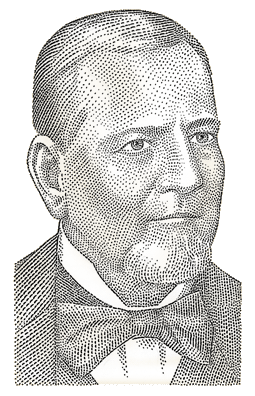The Legendary Craftsmen
-
Col. Edmund Haynes Taylor, Jr. -
George T. Stagg -
William Larue Weller -
Pappy Van Winkle -
Albert B. Blanton -
Orville Schupp -
Elmer T. Lee -
Harlen Wheatley -
Ronnie Eddins -
Leonard Riddle -
Oral History Project

William Larue Weller
The Weller family immigrated to Maryland from Germany in the 1740s where they put down roots, purchased a large tract of land and became farmers and millers. They later moved to the Bluegrass state in the mid-1790s and began distilling on their land taking part in the early foundations of the whiskey industry that would go onto to become a defining part of Kentucky culture.
Samuel Weller, the third generation of Wellers in America and second generation distiller, joined another prominent distilling family following his marriage to Phoebe Larue. Their son William Larue Weller, born 1825, had generations of rich distilling history in his blood to guide his success in the evolving industry.
In 1849, W.L. Weller began his career as a wholesale whiskey dealer and distiller carrying on the legacy started by his paternal grandfather and his maternal great-grandfather. Weller first started W.L. Weller & Brothers with his younger sibling Charles before changing the name to W.L. Weller & Sons. Weller continued to grow his whiskey business over the years, gaining interest in his products and processes, and becoming a prominent whiskey brand.
In 1893 Julian P. “Pappy” Van Winkle Sr. was hired onto W.L. Weller & Sons as a whiskey salesman. After W.L. Weller’s passing in 1899, Pappy and his co-worker Alex Farnsley purchased the company in 1908. George Weller, William’s oldest son, remained President of the company until the beginning of Prohibition when Pappy and Farnsley decided to merge with Arthur Stitzel of A. PH. Stitzel Distillery to create Stitzel-Weller Distillery which opened on Derby Day of 1935.
Stitzel-Weller quickly became known for its wheated bourbon recipe using wheat instead of rye in the mash for a softer, smoother taste.
The legacy of William Larue Weller continues to be honored today with award-winning wheated bourbons such as his namesake William Larue Weller, Weller 12 Year, Weller Special Reserve and Weller 107 Antique.